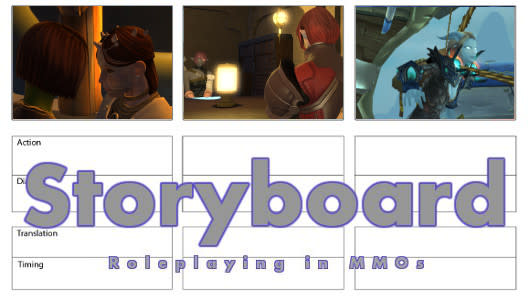Storyboard: Now I only want you gone
Roleplaying friendships are like any other sort of friendship. The person you started roleplaying with at the launch of the game may not be someone you want to keep roleplaying with through the whole of your time with the game. The question isn't whether or not this will happen; it's when it will happen and what you're going to do when you realize that you don't want to play with this person any longer.
What sounds like the simplest thing in the world becomes much harder due to the simple fact that none of us likes telling someone else, "I don't want to interact with you any longer." That means you've got to read the signs and derive a lesson -- and also learn the way that your signals are going to be read, even if you don't mean it that way. So what signs do you get, what signs do you send, and what do you do?

Maybe when I delete you
Though it might seem to be reversed, I'm opening with the most important piece of advice: If you're going to leave, do it.
If you're getting blown off by a guild, delete your application and leave. A friend is subtly telling you that you aren't friends any more? Remove the friend list entry and move on. Cut the tie and keep going. No angry letters, no screaming forum posts, no begging whispers, none of that. Just make a clean cut, take a deep breath, and work through whatever degree of frustration you're feeling without making a big show of it.
I get it, believe me. You spend two months trying to get a guild to notice you, and you're going to want the members to at least acknowledge you before you leave. You want them to know what they did. You want to make it stick because it really hurts to be blown off for that long.
But let's look at the possible outcomes here. The first possibility is that they were intentionally trying to get you to leave, that you were being ignored in the hopes that you would get up and go away on your own time. This, as it turns out, is exactly what happened. That's probably not something you really want the people in question to feel happy about, and noisily shouting about how you've been wronged isn't going to reverse it.
On the other hand, maybe it's totally unintentional, at which point your screaming tirade is just the sum of your being passive-aggressive to someone else. If you wanted to talk about what was happening, you would have already done so. Quite possibly you already have. And there are some things that are just so boneheaded that having to explain why they bothered you means that it's not worth it.
Just leave. No drama. No explosion. Shut the door. Don't block them and pretend to not realize they exist; you want to close the door, not lock it and nail it shut. But do let it go.
You want your freedom, take it
Let's say you have a friend named Cassie. You've known Cassie a long time in-character, but you also notice that every time you try to set up roleplaying with Cassie, something comes up. Things keep being postponed. One problem crops up, then another, then another. She never strikes up a conversation with you; it's always you sending the first whisper, you starting things out, you expressing an interest.
It's certainly possible that Cassie is inundated with things to do at every juncture. But there are friends whom I talk to more or less every day and friends whom I talk to less frequently, and in all cases it's a matter of give and take. And if you have to postpone something with a friend, you push that to the top of your "to-do" list if you actually want it done in the first place.
There are a lot of different reasons that someone might not be paying any attention to you, most of them not malicious. So the best idea is to back off. Constantly trying to get attention makes you look, well, immature. The trick is learning when something crosses the line between someone being quiet and someone outright ignoring you.
I can't tell you exactly where that line is because it varies a lot based on circumstance. I can give you things that fall far on one side of the line; if a guild hasn't answered your application in over a month, odds are good that you're not welcome. But the key is really seeing how often someone is around compared to how often you interact and comparing that to how many times you try to start interactions. If you try to set up something with a friend and it gets postponed for three weeks, you really don't expect silence to follow. If it does... well, maybe that's a sign.

You're someone else's problem
So let's get back to Cassie. Leaving isn't the only option there, but it might be the best one.
The first thing to do, always, is talk. If you took a shot for every time I stressed OOC communication in these columns, you would be only mildly less drunk than if you took one for each use of the word verisimilitude. But this is one of those situations where OOC communication may or may not actually fix the issue.
Why? Well, let's assume Cassie isn't intentionally avoiding you. (If she is, OOC communication obviously isn't going to fix anything.) It's entirely possible that she's totally oblivious to why you're upset in the first place. But that just raises the question of why. Why do you have to say to Cassie that this bothers you in the first place? Why do you need to explain that you're upset because you scheduled something, she kept putting it off, and she frequently did so to roleplay with other people?
Yes, technically you could talk to your boyfriend about why you're mad after he greets your father with a body check and screamed obscenities. But explaining why that wasn't all right doesn't fix the problem. This is something so simple, so obvious, that you shouldn't need to explain any of it. Having to explain it is more upsetting than having to deal with it in the first place.
There's no simple way to determine whether or not you can talk past it. It's always an option worth considering. But it's a good quick check to ask what you would expect if the positions were reversed. If you think your roleplay buddy would be mad to be treated the same way... well, maybe it's time to skip back to the start of the column and take some free advice.
Feedback, as always, is welcome down in the comments below or via mail to eliot@massively.com. Next week, it'll be time to discuss event pacing and numbers, and the week after that, I want to ask why your character sticks around.

Every Friday, Eliot Lefebvre fills a column up with excellent advice on investing money, writing award-winning novels, and being elected to public office. Then he removes all of that, and you're left with Storyboard, which focuses on roleplaying in MMOs. It won't help you get elected, but it will help you pretend you did. If you need a refresher, check out the Storyboard Library.


